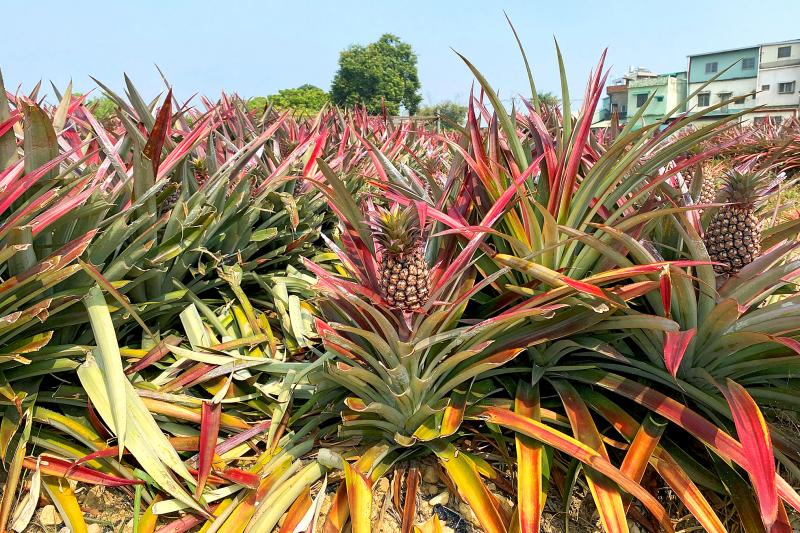China’s ban on Taiwanese pineapples was “unsurprising,” and Taiwan should have years ago altered its produce export strategies and target customers, experts said.
China on Friday abruptly suspended imports of pineapples from Taiwan, saying that it had on multiple occasions discovered “harmful biological entities” on the fruit.
Calling it an “unfriendly” move, the Council of Agriculture (COA) said that 99.79 percent of the pineapples sent to China since last year have met China’s import standards.

Photo: Ben Blanchard, Reuters
Chiao Chun (焦鈞), the author of Fruits and Politics — A Recollection of Cross-strait Agricultural Interaction Over the Past Decade (水果政治學:兩岸農業交流十年回顧與展望), said that China’s announcement is clearly targeting Taiwan, as the Taiwanese pineapple season is from mid-February to June every year.
There might have been other factors, in addition to the deterioration of cross-strait relations since 2016, that led China to make such a decision, he added.
Chiao said that China is no doubt hoping to use produce exports as a bargaining chip should the Democratic Progressive Party (DPP) give in to pressure from farmers.
China is a volatile, high-risk market, as the Chinese government tries to foster dependence on its market, and then uses this reliance to obtain seeds and other technology with the goal of eventually taking over a market segment, especially in produce, Chiao said, adding that this has been a known ploy used for years.
The atemoya, a hybrid of sugar apple and cherimoya, is likely the Chinese government’s next target, Chiao said.
National Taiwan University Department of Agricultural Economics professor Hsu Shih-hsun (徐世勳) said the best response is to expand the export of Taiwan’s agricultural produce to other countries.
Last year, Taiwan exported 41,661 tonnes of pineapples to China, worth NT$1.49 billion (US$52.64 million) and accounting for 91 percent of Taiwan’s total pineapple exports, government data showed.
Japan was the second-biggest importer, with 2,160 tonnes, while Hong Kong and Singapore imported 1,186 and 421 tonnes respectively, data showed.
Taiwan could improve its capability to process agricultural products, which would extend the produce’s shelf life, added value and gross profit margin, Hsu said, adding that this would mitigate a reliance on refrigeration for fresh produce.
However, the COA would first need to be in charge of produce production and processing, as the latter is under the jurisdiction of the Ministry of Economic Affairs, he said.
National Feng Chia University Department of International Business professor Yang Min-hsien (楊明憲) said that China should not target Taiwanese farmers if it wished to extend an olive branch to Taiwan.
Additional reporting by CNA

Taiwanese can file complaints with the Tourism Administration to report travel agencies if their activities caused termination of a person’s citizenship, Mainland Affairs Council Minister Chiu Chui-cheng (邱垂正) said yesterday, after a podcaster highlighted a case in which a person’s citizenship was canceled for receiving a single-use Chinese passport to enter Russia. The council is aware of incidents in which people who signed up through Chinese travel agencies for tours of Russia were told they could obtain Russian visas and fast-track border clearance, Chiu told reporters on the sidelines of an event in Taipei. However, the travel agencies actually applied

Japanese footwear brand Onitsuka Tiger today issued a public apology and said it has suspended an employee amid allegations that the staff member discriminated against a Vietnamese customer at its Taipei 101 store. Posting on the social media platform Threads yesterday, a user said that an employee at the store said that “those shoes are very expensive” when her friend, who is a migrant worker from Vietnam, asked for assistance. The employee then ignored her until she asked again, to which she replied: "We don't have a size 37." The post had amassed nearly 26,000 likes and 916 comments as of this

New measures aimed at making Taiwan more attractive to foreign professionals came into effect this month, the National Development Council said yesterday. Among the changes, international students at Taiwanese universities would be able to work in Taiwan without a work permit in the two years after they graduate, explainer materials provided by the council said. In addition, foreign nationals who graduated from one of the world’s top 200 universities within the past five years can also apply for a two-year open work permit. Previously, those graduates would have needed to apply for a work permit using point-based criteria or have a Taiwanese company

The Shilin District Prosecutors’ Office yesterday indicted two Taiwanese and issued a wanted notice for Pete Liu (劉作虎), founder of Shenzhen-based smartphone manufacturer OnePlus Technology Co (萬普拉斯科技), for allegedly contravening the Act Governing Relations Between the People of the Taiwan Area and the Mainland Area (臺灣地區與大陸地區人民關係條例) by poaching 70 engineers in Taiwan. Liu allegedly traveled to Taiwan at the end of 2014 and met with a Taiwanese man surnamed Lin (林) to discuss establishing a mobile software research and development (R&D) team in Taiwan, prosecutors said. Without approval from the government, Lin, following Liu’s instructions, recruited more than 70 software